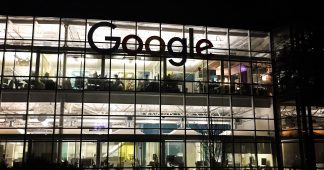By Andre Damon
7 September 2018
Last September, the New York Times published an article, appearing on the first page of its business section, reporting allegations by the World Socialist Web Site that the internet search monopoly Google was censoring left-wing, anti-war and socialist web sites.
The article prominently cited, and linked to, the WSWS’s open letter to Google, “Stop the censorship of the Internet! Stop the political blacklisting of the World Socialist Web Site!” The open letter presented evidence that “Google is manipulating its internet searches” in order to “block news that your company does not want reported and to suppress opinions with which you do not agree.”
But on Wednesday, the Times posted on its website (and published Thursday on the front page of the business section of its Thursday print edition) an article by the same author, Daisuke Wakabayashi, which is a white-wash of Google’s censorship regime, echoing the company’s self-serving denials without any serious examination of the facts.
The article is the latest in a series of similar pieces by major US news outlets, which, using as a foil President Trump’s claims that the company is censoring right-wing news sources, uncritically parrot Google’s denials that it is blacklisting sites based on their political views.
Wakabayashi writes: “Google said political ideology was not a factor in any aspect of its search results. Google said that whether a user is conservative or liberal is not part of the information collected by the company, and that it didn’t categorize web pages by political leanings.”
He continues: “However, the scrutiny over misinformation after the 2016 presidential election pushed Google to make a change to its search algorithm. At the time, Google found that 0.25 percent of its daily traffic linked to intentionally misleading, false or offensive information. It wanted to surface what it called more ‘authoritative’ content in search results.”
The closest the author comes to a critical examination of the company’s claims is the following passage: “The change drew complaints that it prompted a steep drop-off in traffic. But the organization that complained and all the sites whose traffic it cited leaned to the left.”
The “organization that complained” about Google’s demotion of what Wakabayashi cynically calls “misleading, false or offensive information” is the World Socialist Web Site , whose name goes unmentioned in the journalist’s new article. What Google demoted was, in fact, not “misleading, false or offensive information,” but political viewpoints critical of the US government and the political establishment.
The Times ’ whitewash of Google’s censorship is all the more egregious given the fact that, in the year since the publication of Wakabayashi’s September 2017 report, every major claim made in the WSWS open letter to Google has been confirmed.
The letter argued that in attempting to censor the internet, Google was acting as an agent of the state intelligence apparatus, with the aim of placing limits on the freedom of speech protected by the First Amendment of the US Constitution. Statements made by leading lawmakers and intelligence officials over the past year prove the correctness of this assertion.
* At a February 2018 hearing before the Senate Intelligence Committee, FBI Director Christopher Wray praised the US intelligence agencies’ greater “engagement” and “partnership” with the private sector, concluding, “We can’t fully police social media, so we have to work with them so that they can police themselves.”
* At a November 2017 House Intelligence Committee hearing, Congressman Adam Schiff said that Google had a “societal obligation” to change the fact that “What ends up percolating to the top of our feeds tends to be things we were looking for.”
* At a November 2017 hearing before the Senate Judiciary Committee, former FBI agent Clint Watts declared: “Civil wars don’t start with gunshots, they start with words… We all must act now on the social media battlefield to quell information rebellions… Stopping the false information artillery barrage landing on social media users comes only when those outlets distributing bogus stories are silenced.”
In the year since Wakabayashi published his initial article, executives at major technology companies have made increasingly clear their efforts, in partnership with the US intelligence agencies, to control what their users say and read.
The same day that the Times posted Wakabayashi’s article, the Senate Intelligence Committee held a hearing at which top executives at Facebook and Twitter pledged to intensify their censorship of the internet. Facebook Chief Operating Officer Sheryl Sandberg explained how Facebook blocked the distribution of statements disputed by its “fact checkers,” excluding “bad speech” and promoting “good speech.”
Sandberg said that when content is “marked as false” by Facebook’s fact checkers, “we dramatically decrease the distribution on our site, we warn you if you’re about to share it, we warn you if you have shared it, and importantly, we show related articles next to that so people can see alternative facts.”
She continued: “The fundamental view is that bad speech can often be countered by good speech, and if someone says something not true and they say it incorrectly, someone else has the opportunity to say, ‘Actually, you are wrong. This is true,’ and that’s what we’re working on through our systems.”
By deciding which political views are “true” and which are “false,” by censoring “bad speech” and promoting “good speech,” by replacing statements it disapproves of with “alternative facts,” Facebook is carrying out a deliberate and systematic effort to manipulate public opinion on behalf of its partners in the US intelligence agencies.
The exact same methodology is used by Google, but on an even broader scale. While Facebook censors and tampers with the statements of users on its own proprietary platform, Google’s censorship affects how the great majority of people all over the world find and access information on the public internet, for which the company’s search service provides a vital guide.
In his article, Wakabayashi presents Google’s search ranking system as a mysterious black box. But its operation is far less secretive than he makes it appear. Google’s response to millions of search queries is meticulously tracked and analyzed by private search analytics tools, which the World Socialist Web Site has used in its research. Moreover, Google’s own statements make clear the mechanism by which it has implemented its censorship regime.
The popularity of Google’s search engine was based on the effectiveness of its PageRank algorithm, which functioned as a type of crowd-funded system based on the sentiments of the literate public. The more widely cited and linked a web domain was, the more highly it placed in searches.
The World Socialist Web Site, with its vast, highly researched and extremely diverse catalog of articles on topics ranging from cinema to photography to the history and contemporary politics of nearly every country on earth, is widely cited on the internet and in print—from books, to blogs, to academic research papers, student essays and the national press in developing countries.
It was no surprise that a search for almost any contemporary geo-political topic would return articles from the World Socialist Web Site in the top 100, and often in the top 10 or top three listed results. Examples included: “is the US going to war with Iran” (first place), “nuclear war China” (first place), “social inequality in the world” (second place), “poverty and social inequality” (third place), “anti-war literature” (third place), and “UAW (United Auto Workers) negotiations” (third place).
But in April of 2017, Google announced a radical change to its search ranking system. Instead of passively reflecting what internet users saw as authoritative, it would now base the rankings of search results on the input of search evaluators given clear instructions to down-rank sites whose narratives conflicted with those of the political mainstream.
In his April 25, 2017 blog post announcing the changes to Google’s algorithm, the company’s vice president of engineering, Ben Gomes, linked to the guidelines issued to the company’s evaluators, which made clear that Google’s search engine should show results from sites presenting “alternative viewpoints” only if “the query clearly indicates the user is seeking an alternative viewpoint.”
In a manner precisely consistent with this mechanism, pages from the World Socialist Web Site were, within two months, removed from results for the queries noted above.
Wakabayashi made no serious effort to question Google’s claims. He did not reach out for comment to the World Socialist Web Site, or, for that matter, any other critic of Google, of which there are not a few. But this type of self-censorship is endemic in the American media, which has systematically sought to downplay the vast constitutional implications of the censorship regime being built right before their eyes.
To cite just one example, despite the fact that there were dozens of reporters in the room when Sheryl Sandberg declared her intention to replace “bad speech” with “alternative facts,” not a single US newspaper even reported the phrase.
This self-censorship by the American press is shameful. It is a reminder of the power and vital importance of a free and open internet, which is essential in breaking the stranglehold of a media apparatus that will defend any official crime, no matter how flagrantly unconstitutional.
Sandberg’s statements are a warning that a massive escalation of the attack on freedom of speech and expression is in the making. There is limited time. We urgently appeal to all of our readers to join our struggle against internet censorship.









